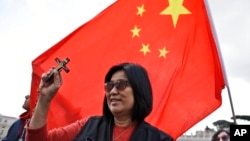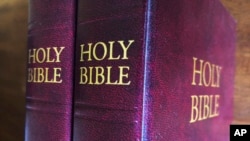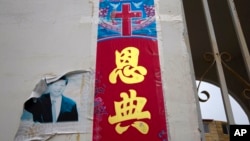New measures handed down by the Chinese Communist Party that it says will strengthen the regulation and management of religious venues appear to be further restrictions on religious freedom and go into effect Friday.
The Administrative Measures for Religious Activity Venues requires religious venues to "support the leadership of the CCP, support the socialist system, and thoroughly implement Xi Jinping's new era of socialism with Chinese characteristics."
The new rules prohibit organizations and individuals from using religious venues to endanger national security or to disrupt social order, public interests or citizens' legal rights, among other activities.
Bitter Winter, a website that tracks religious freedom and human rights in China, wrote last week that the new edict "confirms that religious activity venues should actively broadcast CCP propaganda, or face liquidation."
It continued to report, "There are stricter provisions for including propaganda content in sermons, and establishing study groups of CCP documents in all places of worship. It is also specified that 'It is prohibited to build large open-air religious statues outside of temples and churches,' and the prohibition also applies to private citizens or donors."
Before the release of the 2022 International Religious Freedom Report on May 15, a senior official of the State Department told the press that China is one of the most serious violators of human rights and religious freedom in the world.
Chinese Embassy Spokesperson Liu Pengyu told VOA Mandarin in an email that "the formulation of the policy guidelines will help further improve the standardization and institutionalization of the administration of venues for religious activities, and safeguard the legitimate rights and interests of venues for religious activities and believers."
Liu wrote "Chinese government protects citizens’ freedom of religious belief in accordance with the law. People of all ethnic groups in China are fully entitled to the freedom of religious belief as prescribed by law... We urge relevant parties to stop using the so-called religious issues to meddle in China’s internal affairs."
Liu Fenggang is the former pastor of Holy Love Fellowship, a Christian house church in Beijing, who now lives in Canada after spending years in detention for his activism on religious freedom.
He said that under the new measures, if Christians must support the Communist Party and socialism, Christians "should just join the Party."
Chen Jiangang, a Chinese human rights lawyer now living in the U.S., said this is the first time religious personnel are being required to adhere to "Xi Jinping Thought on Socialism with Chinese Characteristics for a New Era."
He added that the regulations have completely deprived the Chinese people of their religious freedom, saying, "the recent religious regulations issued by the CCP have almost deprived us of all freedom in the religious field."
According to a Pew report released Aug. 30, Measuring religion in China, Beijing recognizes five religions — Buddhism, Catholicism, Islam, Protestantism and Taoism — and "closely monitors their houses of worship, clergy appointments and funding. Many activities that could help to maintain or expand these five zongjiao groups are banned, including proselytizing and organized religious education for children, such as Sunday schools or religious summer camps. Enforcement has varied over time and by province, but since President Xi Jinping came to power in 2012, local officials have been less likely to overlook such activities."
Controls have increased since 2018, when Beijing issued the Regulations on Religious Affairs.
In early 2021, China's State Administration for Religious Affairs promulgated the Measures for the Administration of Religious Clerical Personnel, which came into effect on May 1, 2021.
Last year, on June 21, the Financial Management Measures for Places of Religious Activities, came into effect.
Liu said that the latest move indicates that the CCP's control over religious freedom is getting tighter and the measures are written to sinicize Christianity.
Chen believes that the various regulations on religious activities, personnel and property listed in the "Measures" do not protect religious freedom but rather enshrine the CCP's strict control over religion.
The new measures refer to monasteries, mosques, churches and other fixed religious activity sites registered in accordance with previous regulations including Regulations on Religious Affairs.
The Measures do not seem to apply to underground churches or house churches that are not officially registered and usually do not have a fixed place of activity.
"They directly characterize [house churches] as illegal, with illegal personnel, illegal gatherings, and illegal property donations," said Chen. "The places are banned and closed, and the personnel are punished, arrested, and sentenced. For property, it is basically confiscated."






